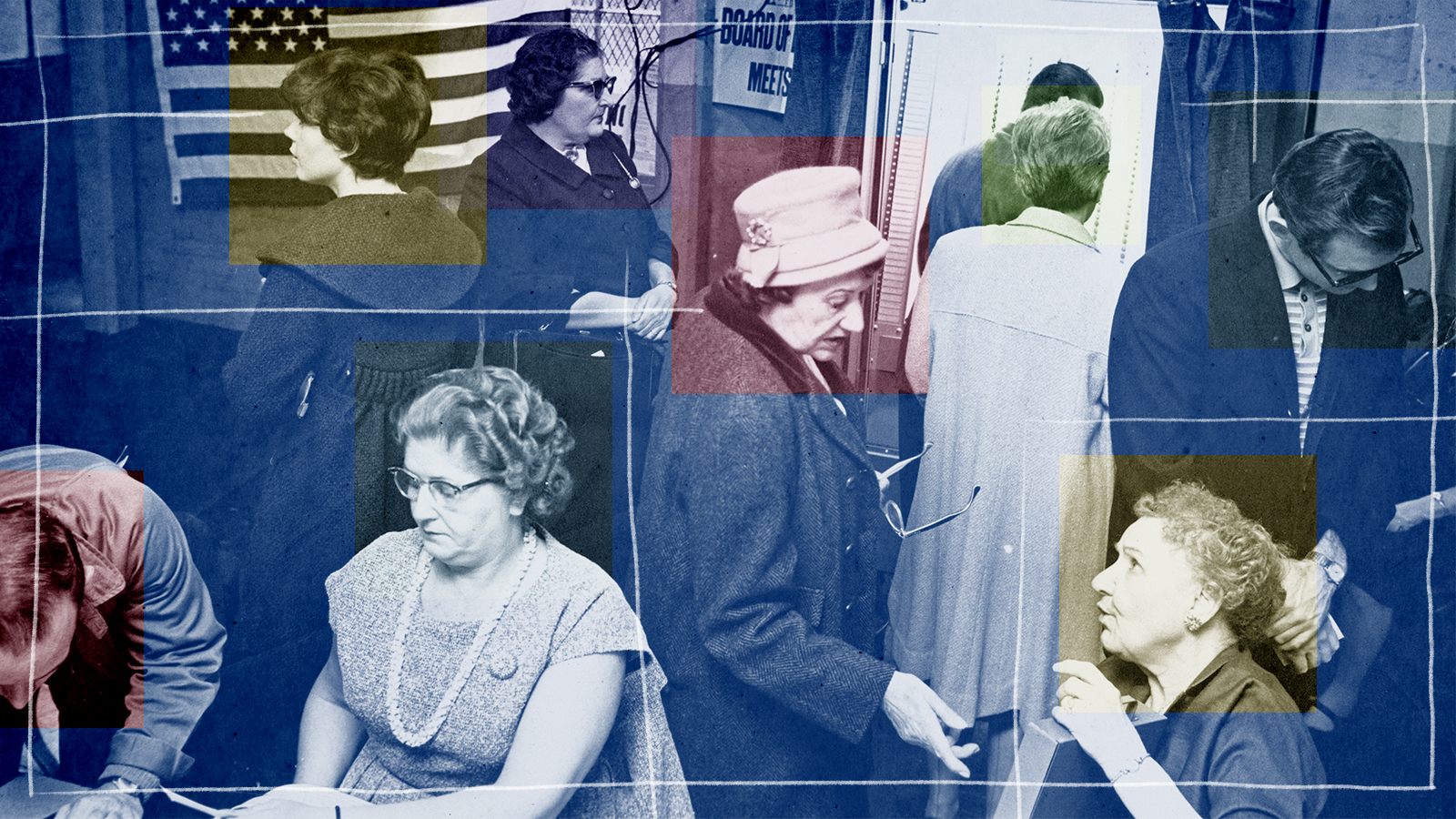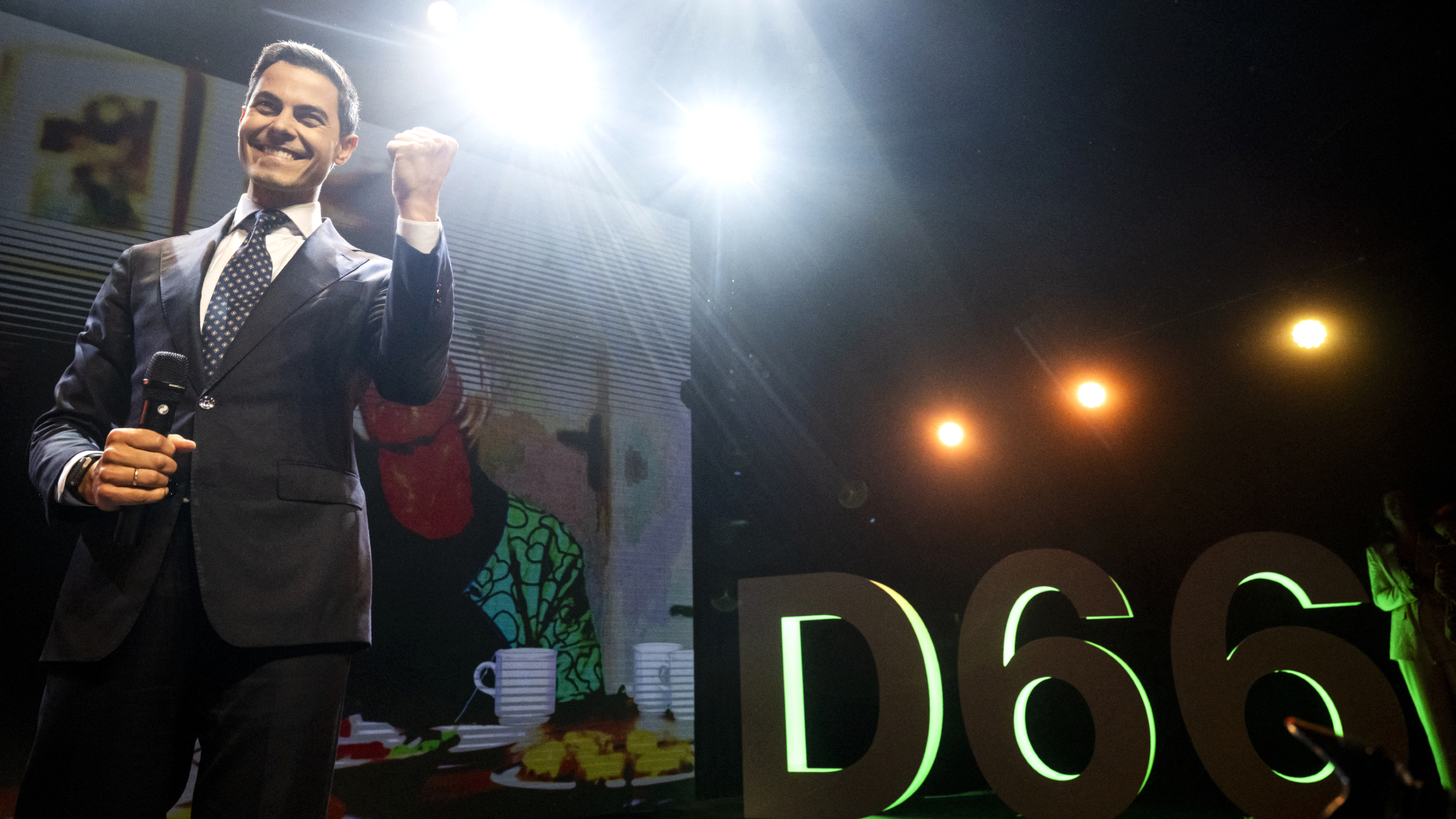The most compelling case against mail-in voting has nothing to do with fraud
A skeptic's case for traditional voting


A free daily email with the biggest news stories of the day – and the best features from TheWeek.com
You are now subscribed
Your newsletter sign-up was successful
A showdown is coming. Stymied in their efforts to pass Build Back Better, House Democrats are moving forward with a pair of bills designed to standardize voting practices while increasing participation. Previously a skeptic about the possibility of eliminating or limiting the filibuster to pass voting legislation — and, realistically, perhaps still doomed to frustration on that point — President Biden embraced the tactic in his speech in Atlanta on Tuesday. According to Biden, nothing less than the future of democracy depends on the proposed reforms.
The package is pared down from Democrats' hopes, though. For example, the Freedom to Vote bill drops earlier proposals to establish public financing for congressional elections and includes a voter ID provision (albeit more flexible than many state requirements). Its core, though, represents an unprecedented nationalization and expansion of voting procedures, including federal mandates for at least 15 days of early voting and no-excuse mail ballots (which some states have long offered and others adopted during the pandemic).
Beyond federalism concerns, which tend to fluctuate according to partisan interests, most Republican objections revolve around suspicions of fraud. Although these fears have been supercharged by former President Donald Trump's insistence that the 2020 election was rigged, prominent Republicans have been making versions of the claim for years. In 2008, the late John McCain, who has since been canonized as a kind of moderate saint, argued that activist groups supporting then-candidate Barack Obama were on "the verge of maybe perpetrating one of the greatest frauds in voter history in this country, maybe destroying the fabric of democracy."
The Week
Escape your echo chamber. Get the facts behind the news, plus analysis from multiple perspectives.

Sign up for The Week's Free Newsletters
From our morning news briefing to a weekly Good News Newsletter, get the best of The Week delivered directly to your inbox.
From our morning news briefing to a weekly Good News Newsletter, get the best of The Week delivered directly to your inbox.
But such charges are almost certainly false. Contrary to assertions that it's made up, voter fraud does happen — but as far as anyone can demonstrate, it's disorganized and small-scale. While it cautions that fraud is likely more widespread than the number of successful prosecutions, a database from the conservative Heritage Foundation records just 1,340 proven cases nationwide. With close to 160 million votes in the most recent presidential election, that's simply not enough to justify panic about "election integrity."
The small chance of organized, outcome-determining fraud doesn't mean Democrats' proposals are costless, though. In the name of expanded access, they're promoting a historic change in the meaning of an American election. If measures included in the Freedom to Vote bill pass, the vision of citizens casting ballots in the same way at the same time — up and down a continent, regardless of race, gender, or class — will be fatally undermined. The replacement will be a kind of ongoing poll, in which individuals register their unaccountable preferences in a variety of ways over an extended period.
Why does that matter, provided an equal or greater number of citizens actually participate in the process? To see the problem, you need to consider the function of elections in a modern democracy.
One of those purposes is, of course, to collect and aggregate preferences. In other words, they tell us which candidates or parties the majority (or at least the plurality) of voters prefer. Due to institutions like the Electoral College that weigh votes by geography, majority preferences don't translate directly into electoral outcomes for all offices. But they do provide a kind of numerical legitimacy — which is why we still talk about the popular vote for president, even though it has no legal weight.
A free daily email with the biggest news stories of the day – and the best features from TheWeek.com
Numerical legitimacy is not the only form of legitimacy, though. To sustain itself, democracy can't just be about a larger group imposing its will on a smaller one. It has to appeal to some sense of shared obligation, such that minorities voluntarily defer to majorities.
That's where the traditional conception of voting comes in. Election Day is a ritual that adds civic legitimacy to the numerical kind. Requiring the vast majority of voters to cast ballots in person, on the same day, and in more or less the same way promotes the sense that we're all in it together, despite our partisan or ideological differences. That belief, rather than the numbers alone, helps transforms millions of individual preferences into a "mandate" that losers can accept.
To be clear, this association between electoral procedures and institutional deference is based on a kind of myth. There is nothing magical about the legally fixed Election Day or familiar voting booth that confers a special authority that dropping a ballot in the mailbox two weeks earlier lacks. In fact, the secrecy that Americans now regard as synonymous with democratic elections is itself a relatively recent innovation. Adopted in the late 19th century, the so-called "Australian ballot" replaced earlier voting practices, which were far more public and communal.
And it's not crazy to worry that theoretically neutral, shared procedures can be used in exclusive, partisan ways. Advocates of more expansive voting practices are right when they point out that many Jim Crow-era restrictions included no explicit racial element. It's less often recognized that the secret ballot itself was part of a wave of reforms intended to fight corruption by diverting ostensibly uninformed or easily influenced voters away from the polls. For urban patricians who supported the movement, that very much included white immigrants as well as African Americans.
But rituals matter, even though they're not altogether rational and are open to misuse. In an increasingly low-trust society where the experience of daily life varies considerably among places and milieux, voting can be among few truly shared experiences. The methodical, spatial, and temporal disaggregation of the elections, by contrast, inevitably encourages doubt about the legitimacy of the results. However satisfying it may be, lecturing people about the rarity of fraud or accusing them of being neo-Confederates is very unlikely to persuade them otherwise.
There are non-delusional, non-cynical reasons to be skeptical that efforts to extend voting periods and encourage absentee voting will do much to heal American democracy. With overall turnout at a historic high and racial disparities in participation shrinking (as Yuval Levin noted in a recent column), it's also not clear they're necessary.
But there's at least one element of the Democrats' package that I enthusiastically support. Let's make Election Day a national holiday and give as many Americans as possible a special time to vote, reflect, and celebrate — together.
Samuel Goldman is a national correspondent at TheWeek.com. He is also an associate professor of political science at George Washington University, where he is executive director of the John L. Loeb, Jr. Institute for Religious Freedom and director of the Politics & Values Program. He received his Ph.D. from Harvard and was a postdoctoral fellow in Religion, Ethics, & Politics at Princeton University. His books include God's Country: Christian Zionism in America (University of Pennsylvania Press, 2018) and After Nationalism (University of Pennsylvania Press, 2021). In addition to academic research, Goldman's writing has appeared in The New York Times, The Wall Street Journal, and many other publications.
-
 The EU’s war on fast fashion
The EU’s war on fast fashionIn the Spotlight Bloc launches investigation into Shein over sale of weapons and ‘childlike’ sex dolls, alongside efforts to tax e-commerce giants and combat textile waste
-
 How to Get to Heaven from Belfast: a ‘highly entertaining ride’
How to Get to Heaven from Belfast: a ‘highly entertaining ride’The Week Recommends Mystery-comedy from the creator of Derry Girls should be ‘your new binge-watch’
-
 The 8 best TV shows of the 1960s
The 8 best TV shows of the 1960sThe standout shows of this decade take viewers from outer space to the Wild West
-
 Kurt Olsen: Trump’s ‘Stop the Steal’ lawyer playing a major White House role
Kurt Olsen: Trump’s ‘Stop the Steal’ lawyer playing a major White House roleIn the Spotlight Olsen reportedly has access to significant US intelligence
-
 Japan’s Takaichi cements power with snap election win
Japan’s Takaichi cements power with snap election winSpeed Read President Donald Trump congratulated the conservative prime minister
-
 How realistic is the Democratic plan to retake the Senate this year?
How realistic is the Democratic plan to retake the Senate this year?TODAY’S BIG QUESTION Schumer is growing bullish on his party’s odds in November — is it typical partisan optimism, or something more?
-
 The billionaires’ wealth tax: a catastrophe for California?
The billionaires’ wealth tax: a catastrophe for California?Talking Point Peter Thiel and Larry Page preparing to change state residency
-
 Bari Weiss’ ‘60 Minutes’ scandal is about more than one report
Bari Weiss’ ‘60 Minutes’ scandal is about more than one reportIN THE SPOTLIGHT By blocking an approved segment on a controversial prison holding US deportees in El Salvador, the editor-in-chief of CBS News has become the main story
-
 Has Zohran Mamdani shown the Democrats how to win again?
Has Zohran Mamdani shown the Democrats how to win again?Today’s Big Question New York City mayoral election touted as victory for left-wing populists but moderate centrist wins elsewhere present more complex path for Democratic Party
-
 Dutch center-left rises in election as far-right falls
Dutch center-left rises in election as far-right fallsSpeed Read The country’s other parties have ruled against forming a coalition
-
 Millions turn out for anti-Trump ‘No Kings’ rallies
Millions turn out for anti-Trump ‘No Kings’ ralliesSpeed Read An estimated 7 million people participated, 2 million more than at the first ‘No Kings’ protest in June
